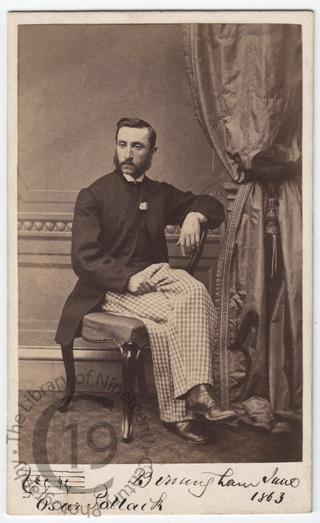
Oscar Pollack
Oscar Pollack appears on the 1861 census, living at 78 Spencer Street in Birmingham, the residence of his older brother Morris Pollack. Both men were born in ‘Silesia, Prussia.’ Morris gave as his profession: ‘Merchant’s clerk & Gilder, employing 1 man & 3 girls.’ Oscar gave only ‘Merchant’ as his profession. Also present were Morris’s wife and their two young daughters, and one housemaid. Oscar was 22 years old and
unmarried.
A Birmingham trade directory of 1868 lists him as a ‘Professor of Music’ at 28 Colmore Row, Birmingham.
By the time the census was taken in 1871 he had moved into a house of own at 188 Islington, Birmingham, where he was living with a ‘railway servant’ and his wife, who was the the housekeeper. He now gave ‘Professor [of] Music’ as his profession.
In 1873 he became a Naturalised British Subject. According to the certificate of naturalisation, he identified himself as a ‘Subject of Germany — aged 34 years — a Merchant, unmarried.’ He gave his address as 22 Legge Lane, Birmingham. He signed the form on 30 August and it was registered on 1 September.
A Birmingham trade directory of 1879 lists him under ‘Teachers of Music’ and gives his address as 21 Broad Street. He organised a great many concerts during his years in Birmingham and his name appears in hundreds of articles reporting on these various musical events.
In 1911, aged 72, he was living at 56 Duchess Road in Edgbaston with his wife Melanie, who was born in Austria. According to the census return, they had been married 31 years and had 3 children. All the children were still alive. Oscar gave as his profession ‘Professor of Music & Languages.’ Melanie, aged 59, described herself as a ‘Professor of Singing.’
According to the Pall Mall Gazette (15 January 1880), on January 8 at Graz in the Austrian state of Styria, ‘Oscar Pollack of Broad-street, Birmingham’ had married ‘Thekla A.M., daughter of Mr Johann Kuschel, of Graz.’
One of their sons, Maurice Pollack, died ‘from wounds received in action’ in October 1918, shortly before the end of the First World War. Before the war he had shown some promise as a child actor; he was ‘best known perhaps as Little Lord Fauntleroy’ (The Stage, 31 October 1918).
Oscar Pollack died on 28 September 1927 at 56 Duchess Road, Edgbaston. He left an estate valued as £511. His executer was his son Martin Percy Pollack, a company secretary.
‘The death occurred yesterday at his residence, Duchess-road, Edgbaston, of Mr Oscar Pollack, who for many years was a well-known figure in the musical life of Birmingham and a highly-respected critic. He was in his 90th year, and had been bedridden for two years.
‘He was born in Upper Silesia, and came to Birmingham to join his brother, the late Mr Maurice Pollack, who became an alderman of the city, and was Mayor in 1887.
‘For some years Mr Oscar Pollack was engaged in the same business as his brother, who was associated with Sir Josiah Mason in the pen trade, but he abandoned business and went in for music, being already an accomplished pianist. He was also a teacher of languages. He was German master at Repton Grammar School for some years, and subsequently held a similar appointment at Five Ways Grammar School.
‘But it was as a music critic that he was best known in the city, and during the 27 years he occupied this position he made for himself a host of friends in the musical life of Birmingham’ (Birmingham Daily Gazette, 29 September, 1927).
His widow died, aged 85, in 1935. According to her obituary, she was ‘One of the most vivid and best known personalities in the artistic life of Birmingham. […] The soirées which she used to give at her former home in Duchess-road, Edgbaston, attracted professional and amateur experts in various phases of the arts (particularly musicians and actors) and her personal acquaintances included scores of celebrities. Madame Pollack had a magnificent contralto voice, and dramas and operatic excerpts were given under her direction in most of the city’s halls and theatres. […] She was born in Austria and was able to sing in four languages’ (Birmingham Daily Gazette, 7 September 1935).
Photographed by Elisha Mander of Birmingham.
Inscribed by the sitter in 1863 recto in the lower margin, with a dedication verso in Italian — ‘Alla la piccolina pianista […] dal suo maestro’ to Flora Wertheimer. According to the 1861 census, Flora, aged 9, was the eldest of the four children of Martin Wertheimer, a Naturalised British Subject from Germany, who gave ‘Stone Dealer & Factor’ as his profession. Her mother Miriam was from London. The family were living at 1 Northampton Street in Birmingham. On 5 July 1871 ‘Flora, daughter of the late Mr M. Wertheimer, of Birmingham’ married ‘Mr G. Myers, of Birmingham (Pall Mall Gazette, 7 July 1871).
Code: 127981




